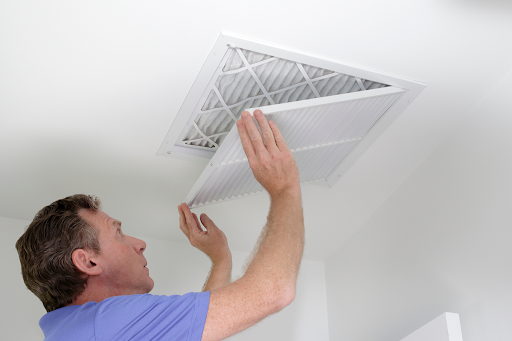Your home’s air conditioning system supplies you and your family with crisp, cool air on a regular basis. With all of the excellent benefits these systems provide, you might be wondering how air conditioners improve indoor air quality (IAQ).
Air quality is a major worry for many homeowners, especially those that experience frequent asthma and allergy symptoms. However, there are some common misconceptions when it comes to the way our air conditioners work. As a result, you may be misinformed when talking about how air conditioning affects indoor air quality.
Let’s discuss whether or not ACs improve IAQ and what you can do to create clean indoor air.
ACs and Air Quality
So, does air conditioning help improve indoor air quality? In short, the answer is “no.” If you have a central air conditioner, you might be surprised to learn that your system never brings outdoor air into your home. Instead, your AC collects the air that’s already inside your home. Then, your air conditioner’s refrigerant and evaporator coils remove heat from the air. The resulting cool air is then sent back out for you to enjoy via ductwork.
Air conditioners also don’t inherently let in fresh air — or purify indoor air, for that matter. However, you can equip your AC with an air filter that has a high MERV rating. Your air filter is designed to collect airborne pollutants to keep them from recirculating in your home. The higher the MERV rating, the more pollutants the filter will trap.
How To Choose an Air Filter
In a way, air conditioning does help improve indoor air quality when it’s paired with a higher-end air filter. The MERV rating for an HVAC system’s filter can range from 1 to 20. However, it’s worth noting that some filters cannot be used in a residential setting.
Filters with a MERV 13 or higher rating are typically used for medical and professional facilities. If you suffer from frequent allergy and asthma symptoms, you might want to opt for a filter with a MERV 8 to 12 rating. If you’re unsure which filter is suitable for you, contact a Prosper, TX HVAC technician to help you find the right solution for your needs.
How to Improve Indoor Air Quality
Now that you know how air conditioners improve indoor air quality — and how they don’t — you can make a plan to enhance your IAQ.
Believe it or not, indoor air can be up to five times more polluted than outdoor air. As such, it’s understandable why homeowners are concerned about indoor air pollution and removing it once and for all. Your home could be swimming with more airborne contaminants than you realize, and fixing the problem can help improve your family’s health and comfort.
Let’s go over two potential ways to improve indoor air quality inside your home.
Install an Air Purification System
When discussing how air conditioners improve indoor air quality, it’s impossible to overlook whole-home air purification systems. These air purifiers connect directly to your HVAC system to collect and remove a wide range of airborne pollutants, effectively cleaning the air in your home.
Schedule AC maintenance
Do you keep up with the needs of your AC system? If not, you could be missing out on a great opportunity to improve your home’s IAQ. It’s crucial to schedule maintenance to ensure that your system is running as smoothly and efficiently as possible. Clogged air filters and dirty ductwork can lead to dust mites, mold, and other allergens polluting your air.
Routine maintenance services can help you improve airflow, enhance AC performance, and avoid poor indoor air quality.
Contact Tempo Air for Your AC Needs
All-in-all, does air conditioning help improve indoor air quality? While the air conditioner itself doesn’t make a difference in your IAQ, there are a few steps you can take toward healthier air quality.
In learning how air conditioners improve indoor air quality, you might realize that your system needs a replacement or repair. Tempo Air offers a broad range of AC services that will meet your comfort needs. Contact us today to schedule an AC service in Prosper, TX!


